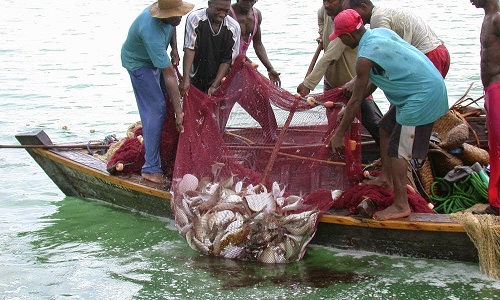The country’s fishing sector’s abysmal performance over the years has deepened, as data released by the Ghana Statistical Service (GSS) for the fourth quarter of 2018 show the industry’s growth has again contracted.
The data show that in 2018 the fishing sector’s growth further contracted by 6.8 percent. This is the sector’s worst performance in four years.
The 2018 negative growth made it the only sub-sector in the agriculture sector that saw a contraction; as crops, livestock, forestry and logging all saw positive growths, though slower than they performed last year.
The sector’s situation is even more disappointing when analyzed every quarter on year-on-year basis.
Between 2017 and 2018 (eight quarters), fishing has seen positive growth in only two quarters— Q3 of 2017 and Q2 of 2018— the rest have all been negative. The fourth quarter of 2018 saw the industry’s growth tumble further to -19.1 percent from -0.8 percent the previous quarter, a true reflection of a sector in recession.
One major reason ascribed to the continued abysmal performance of the sector is what’s commonly referred to as ‘saiko’—which simply means stealing of small pelagic fish by foreign operators and selling it back to the local fishing communities.
According to the Ministries of Fisheries and Aquaculture Development, small pelagic fish make up 80 percent of total marine fish caught and landed in Ghana; and directly employs 150,000 canoe-fishers, 30,000 fish processors, and an estimated 2.7 million people involved in trading, transporting and selling small pelagic fish.
This means that any illegal activity regarding the small pelagic fish will cost the sector substantially.
According to an investigation by the Environmental Justice Foundation (EJF), this practice is already costing the state millions of dollars. EJF estimate that saiko accounted for an estimated 100,000 tonnes of illegal and unreported catches in 2017—with an estimated landed value of US$34-64 million lost annually to the state.
The EJF investigation further revealed that even though the country’s laws forbid foreign ownership or control of vessels flying the Ghana flag, about 90 percent of its industrial fishing fleet is owned by the Chinese.
It also said despite a moratorium on new industrial trawlers entering Ghanaian waters, new vessels continue to arrive from China – defeating efforts to address vast over-capacity and severe depletion of the country’s fish stock.
The situation has heightened calls on government to be tough in enforcing the country’s laws on fishing in order to permanently address or significantly reduce the impact of illegal activities in the fishing sector.
The EFJ report warned that if prompt action is not taken to end the menace of illegal fishing and the collusion of some Ghanaians and Chinese businesses which has led to depleting the fish stock, the country will experience worse results in the sector as many people will lose their livelihoods.








